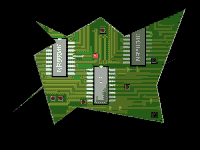Ultimately, the sense one gets from a reading of The Emerging Cyberculture is one of paradox, and, in this regard, I can’t help but think of Winterson, whose narrator longs for both the freedom to be someone new and the fulfillment of her oldest obsessions. We could characterize the move toward meaning making in much the same way: we move to communicate, even as we are bound by the forms of communication surrounding us; but we also move the forms in new directions, only to be bound again by the necessity of communicating at all.
 With so many tracks to follow, so many paths to pursue--and
with an overarching sense of the progression that carries both literacy
and technology with it--I put my copy of The Emerging Cyberculture
aside with a simultaneous sense of forward movement and dispersal.
This is not necessarily a criticism. A more "traditional"--i.e. linear--book
might take us down one particular scholarly road, exploring a particular
terrain of thought; for instance, a book devoted to the theory and practice
of MOOing might seem a bit more (dare I say) straight-forward.
The Emerging Cyberculture does not. It winds, weaves, and
even worms its way through multiple paths. And that may be the point--both
about the advantages of the new communications technologies and
about the way literacy functions, in and through any medium.
With so many tracks to follow, so many paths to pursue--and
with an overarching sense of the progression that carries both literacy
and technology with it--I put my copy of The Emerging Cyberculture
aside with a simultaneous sense of forward movement and dispersal.
This is not necessarily a criticism. A more "traditional"--i.e. linear--book
might take us down one particular scholarly road, exploring a particular
terrain of thought; for instance, a book devoted to the theory and practice
of MOOing might seem a bit more (dare I say) straight-forward.
The Emerging Cyberculture does not. It winds, weaves, and
even worms its way through multiple paths. And that may be the point--both
about the advantages of the new communications technologies and
about the way literacy functions, in and through any medium.
In fact, to return to Joyce, one leaves this book with a sense of literacy itself as motion, and we understand The Emerging Cyberculture as a book of many movements because literacy itself has always already been an entity of many movements tempting us to trace it even as it changes in the tracing. And, as the editors tell us in their introduction--"in the virtual world all our expectations can be turned inside out" (14-15)--then so too can our expectations about literacy be turned--and moved--in different directions. For what is literacy but the motion that has always allowed us varied and multiple technologies to shape meaning--and the world? Tracing the new technologies’ impact on literacy will ultimately tell us more about the function of literacy itself ...
So, if we come to the ultimate question that readers of Kairos will want to have addressed--how will this book be useful for teachers of writing in Webbed environments?--then we see, with Joyce, Winterson, and a host of others, that literacy--in all its varied forms--keeps us in motion; and that may yet be the most influential lesson of The Emerging Cyberculture.